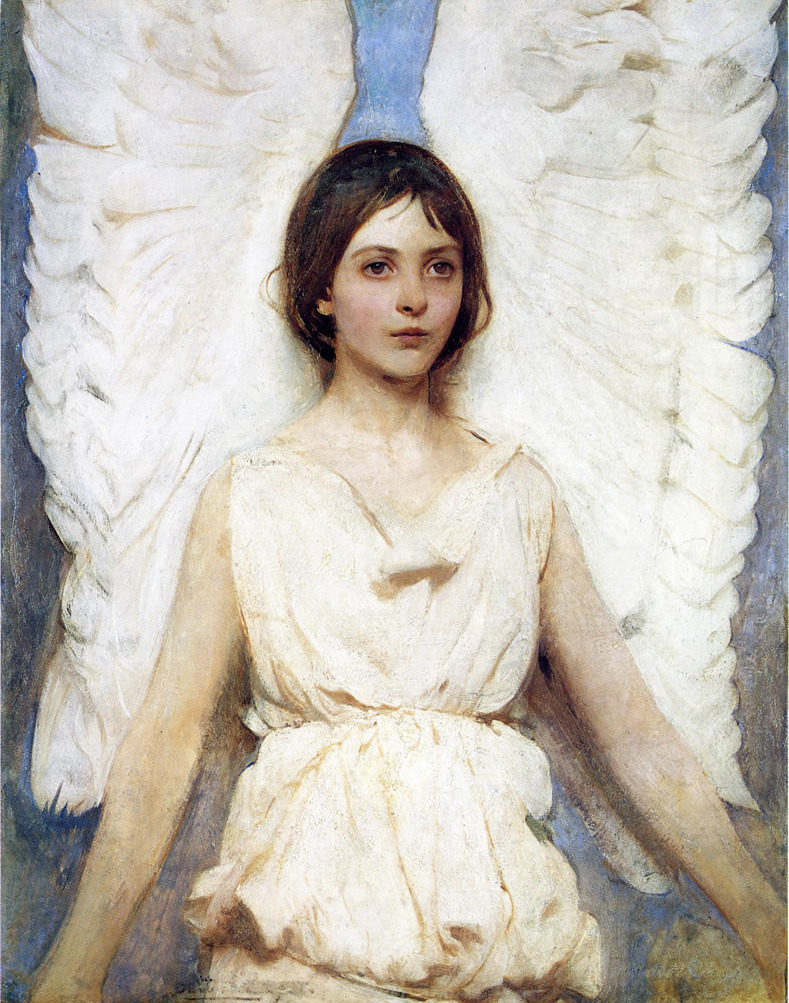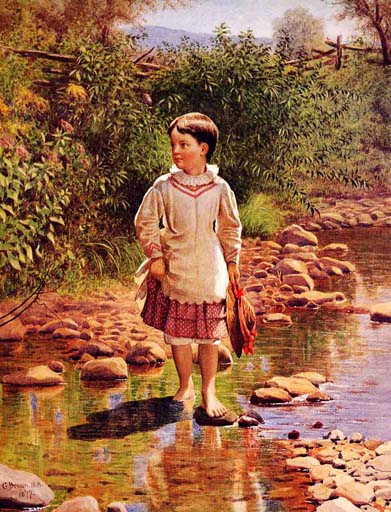The hopes, dreams and fears of girls in the 19th century were
explored in an exhibition which opened at the Newark Museum on Sept. 12, 2012.
Featuring masterworks by John Singer Sargent, Thomas Eakins, Winslow
Homer, Cecilia Beaux and William Merritt Chase, Angels & Tomboys:
Girlhood in 19th-Century American Art explores the numerous ways artists
not only reflected but helped shape cultural and artistic visions of girlhood
in the 1800’s.
“While girls were typically portrayed as innocent, passive and domestic
throughout the 19th century, the exhibition investigates compelling and
alternative female images including tomboys, working children and
adolescents,” said Mary Sue Sweeney Price, Museum Director and CEO.
Among the themes that are explored are Victorian attitudes towards the
nature and nurture of children; the association of girls with fashion, health
and home; and the impact of the Civil War on families.
Organized by Dr. Holly Pyne Connor, Curator of 19th-Century American Art
at the Newark Museum, the exhibition is comprised of more than 80 works
from the Museum’s renowned American art collection and from other major
institutions across the country. The exhibition was on view through January 7,
2013, and then traveled to the Memphis Brooks Museum of Art from
February 16 to May 26, 2013, and will be shown at the Crystal Bridges
Museum of American Art, Bentonville, Arkansas, from June 28 to September 30, 2013.

Ammi Phillips “Girl in Pink”
Ammi Phillips “Boy in Red”

Ammi Phillips “Girl in a Red Dress” c. 1835. Oil on canvas

Abbott Handerson Thayer “Angel”

Fanny Travis "A Little Girl"

Eastman Johnson “The Party Dress” (1872)
%20%20%20Lotus%20Lilies%201888._thumb.jpg?imgmax=800)
“Lotus Lilies” c.1888-Charles Courtney Curran

“Crossing the Brook” c. 1874- John George Brown
Interesting reviews here and here and here.
Catalogue

Hardcover smyth-sewn casebound book, with jacket. 184 pages, 8½ x 11 inches. Over 100 full-color reproductions. Includes Exhibition Checklist and Index.
ISBN 9780764963292
Features over 100 full-color reproductions from the finest American art collections.
In the aftermath of the Civil War, the American girl seemed transformed—at once more introspective and adventurous than her counterpart of the previous generation. She took center stage in the stories of Louisa May Alcott and Henry James at the same moment that contemporary painters, illustrators, photographers, and sculptors asked her to pose. For the first time, girls claimed the attention of genre artists, and girlhood itself seized the imagination of the nation. Although the culture still prized the demure female child of the past, many saw a bolder type as the new, alternate ideal. Girlhood was no longer simple, and the complementary images of angel and tomboy emerged as competing visions of this new generation.
Published in conjunction with the traveling exhibition organized by the Newark Museum, Angels and Tomboys: Girlhood in Nineteenth-Century American Art explores the myriad ways artists portrayed young girls, from the sentimental, innocent stereotype to the freespirited individual. Works by John Singer Sargent, Winslow Homer, and Thomas Eakins, together with those by leading women artists, such as Cecilia Beaux and Mary Cassatt, reveal a new, provocative psychological element not found in early Victorian portraiture, while the mischievous tomboys in Lilly Martin Spencer’s paintings and the pure angels in the works of Abbot Handerson Thayer underscore the complexity of girlhood—and of representing that evanescent phase.
Essays by Holly Pyne Connor, Barbara Dayer Gallati, Sarah Burns, and Lauren Lessing consider the historical, social, and literary contexts of the artworks, drawing on sources as varied as etiquette books, poems, censuses, and the histories of medicine and economics. With more than 130 illustrations—including paintings, sculptures, prints, and photographs—this publication is an illuminating exploration of what it meant to be young, female, and American in the nineteenth century.
The nationally traveling exhibition visits the Newark Museum, Newark, NJ (Sept. 12, 2012–Jan. 6, 2013), the Memphis Brooks Museum of Art, Memphis, TN (Feb. 16–May 26, 2013), and the Crystal Bridges Museum of American Art, Bentonville, AR (June 28–Sept. 30, 2013).
About the Authors
HOLLY PYNE CONNOR is the Curator of Nineteenth-Century American Art at the Newark Museum. She cocurated Picturing America (2001), the ground-breaking exhibition of the Newark Museum’s permanent collection, and organized and coauthored Off the Pedestal: New Women in the Art of Homer, Chase, and Sargent (2006) and Small but Sublime: Intimate Views by Durand, Bierstadt and Inness (2006).
With Contributions By:
SARAH BURNS is Professor Emerita, School of Fine Arts at Indiana University. She is the author of Pastoral Inventions: Rural Life in Nineteenth-Century American Art and Culture (1989), Inventing the Modern Artist: Art and Culture in Gilded Age America (1996), and Painting the Dark Side: Art and the Gothic Imagination in Nineteenth-Century America (2004).
BARBARA DAYER GALLATI is Curator Emerita of American Art at Brooklyn Museum. She is the author of William Merritt Chase (1995), Great Expectations: John Singer Sargent Painting Children (2004), and Making American Taste: Narrative Art for a New Democracy (2011), and a coauthor of Winslow Homer: Illustrating America (2000) and Kindred Spirits: Asher B. Durand and the American Landscape (2007).
LAUREN LESSING is Mirken Curator of Education at Colby College Museum of Art. She is the author of “Ties that Bind: Hiram Powers’ Greek Slave and Nineteenth-Century Marriage,” American Art (Spring 2010), “New Perspective: Rereading Seymour Joseph Guy’s Making a Train,” American Art (Spring 2011), and “Angels in the Home: Adelicia Acklen’s Sculpture Collection at Belmont Mansion,” Winterthur Portfolio (Spring 2011).